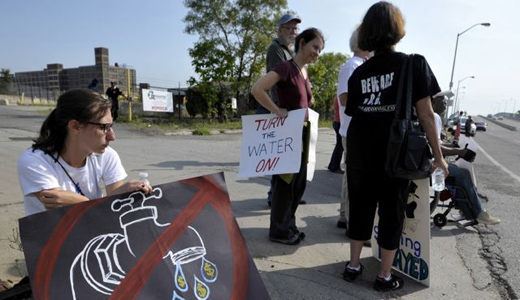
DETROIT – A nine-member, state-named panel, with no unionists among its initial appointees, will run Detroit’s finances for the next 13 years, a court-approved bankruptcy exit plan says. That includes the power to accept or reject the city’s union contracts, the plan adds.
The plan approved by Bankruptcy Judge Stephen Rhodes in early November will cut the city’s debt by billions of dollars. City workforce retirees will see their pensions slashed, while other creditors will also take a cut.
The plan drew no immediate reaction from Detroit’s union leaders, but the lead attorney for the retirees’ committee, Carol Neville, said fees to bankruptcy specialists are $144 million and counting. She said the committee has not agreed to pay further fees after the city exits from bankruptcy, which is expected before the end of the year.
Detroit’s bankruptcy, the largest municipal bankruptcy in U.S. history, was preceded by sharp cuts in the city’s workforce, and a state takeover, through a fiscal “czar,” of all its finances. Before that, the state appointed another czar — both named under a GOP-enacted “failing governments” law — to take over the city schools. That czar promptly fired all 10,000 unionized teachers, most of them minority-group members, rehiring those he chose.
The city financial czar, Kevyn Orr, will give way to the 9-person oversight panel, which includes current city chief financial officer John Hill, plus Detroit’s mayor and city council chair.
While union leaders declined to publicly comment on the bankruptcy plan, attorney Jerry Goldberg, who had led the Moratorium Now! movement in the Motor City and who opposed the plan as a bailout for banks, said retirees would suffer 78 percent of the cuts. His article in an alternative publication also predicted more public workers would lose their jobs to privatization.
“Detroit’s unsecured debt is reduced from $9.61 billion to $2.51 billion. Of that $7.1 billion reduction, $3.85 billion comes from eliminating retiree health benefits and $1.7 billion comes from cuts in pension payments. Thus, a total of $5.5 billion, or 78 percent, of the bankruptcy debt relief comes off the backs of the city’s retirees,” Goldberg explained.
“Instead of being enrolled in health insurance plans where the retirees paid 20 percent of the premium and the city paid the rest, most retirees are now receiving a $125 stipend toward purchasing their own plans on the federal health insurance marketplace. Uniformed retirees get a somewhat higher stipend.
“Non-uniformed retirees also got a 4.5 percent reduction in their base benefits, elimination of cost of living amounting to an estimated additional 22 percent cut in benefits over time, and, for many retirees, a ‘clawback’ of annuity payments they received from 2003 to 2013, amounting to as much as a further 15.5 percent benefit reduction.
“Although accrued pension benefits are guaranteed under the Michigan constitution, Judge Rhodes refused to recognize this constitutional guarantee,” Goldberg said. Faced with even deeper pension cuts, Goldberg said both AFSCME and the retirees committee “abandoned the constitutional challenge and urged acceptance of the cuts, the retirees, in a divided vote, accepted the cutbacks.”
Fire and police retirees earlier agreed to a separate arrangement – a Voluntary Employee Benefits Association with union retirees on its board – to manage their health care plan. And the unionized police reached a contract with the city in August calling for a 15.5 percent wage increase over five years.
Photo: Back in July members of the Peoples Water Board Coalition in Detroit protested against water shutoffs in the city. Todd McInturf/AP & Detroit News












Comments